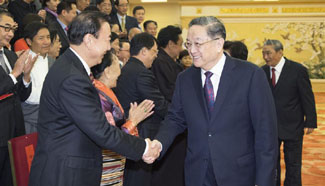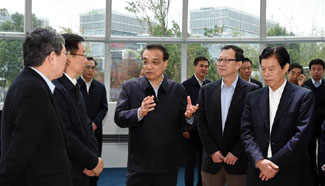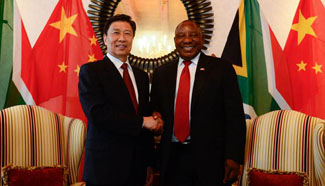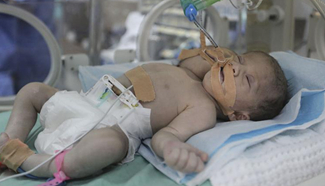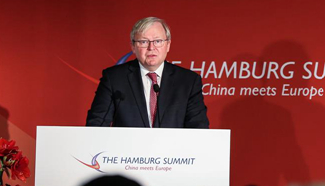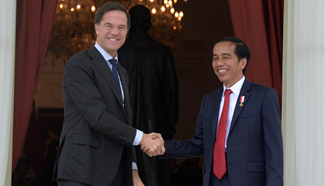by Xinhua writers Xiao Chunfei, Zhao Hui, Shen Hong and Zhou Yan
BEIJING/LIMA, Nov. 23 (Xinhua) -- One hundred years ago, a man disembarked at Callao port in Peru after many weeks at sea, leaving behind a homeland only for his great grandchildren to set foot on a century later.
No one knew his Chinese name. Like most Chinese peasants of his time, he could barely read or write. On the registration paper he gave his name as "Chia" -- probably a family name, which could be Xia, Xie or even Zha in today's spelling.
Starting work as a coolie, he was given a local name, Aurelio.
Chia's descendants knew very little of their great-grandfather, except that he was a native of southern China's Guangdong Province and was aged between 20 and 25 when he arrived in Peru in 1916.
Chia left behind no photo. But his descendants believe he looked like his grandson Juan Francesco Chia Junior, who has a square face, thick eyebrows and long, narrow eyes. Chia Junior, a metallurgical engineer, has just retired, and looks exactly like a Chinese.
Life was tough for first-generation immigrants like Chia. Latin America then had a severe shortage of workers at its plantations, mines and factories -- an influx of Chinese laborers filled the gap.
Chia spent many years toiling in cotton fields in Ica, and saved every spare sol he had. Eventually he saved enough to open a bakery, married an Indian woman and had eight children.
When Chia died in 1959, he was the only one in his family who could speak Chinese. He rested in solitude on a foreign land, against the Chinese tradition that "fallen leaves to return to their roots."
CHINESE BLOOD
Juan Francesco, Chia's sixth child, was born in 1925.
When he was young, the Peruvian economy suffered during the Great Depression as factories closed and unemployment soared. Juan Francesco grew up to be a taxi driver and ran a store. Though life was difficult, he secured adequate education for his 10 children, with all becoming specialists in their respective fields.
Juan Francesco's granddaughter Maria Esther Chia always felt her family was different from other Peruvian families when she was a child.
"We all preferred tea to coffee, and were always punctual whereas most Peruvians tended to be at least 30 minutes late," she said.
"Whenever guests came we insisted they join us for dinner, a gesture of Chinese hospitality," said Maria. "When I was a child, I felt strange. Why we were so different from other Peruvians?"
She found out when she set foot in China in 2007, as the first member of the Chia family to return to China.
A journalism major at the Catholic University of Lima, Maria got an opportunity to study at Peking University as an exchange student. "It was quite a coincidence," she told Xinhua. "I was planning to study in the United States but I was rejected for a visa six times. So I decided to try my luck in China and got my visa easily."
Her Chinese blood worked, and she began to learn Chinese, passing a Chinese proficiency test, the HSK, in less than two years.
Maria chose to stay in China after graduating, out of love for the country and fear that she might forget Chinese once she went back to Lima, and soon won a scholarship for an MBA at Tsinghua University.
During her MBA, she focused on China-Peru trade and economic cooperation, an area she felt seldom covered by researchers, and submitted her thesis in Chinese.
Maria also served as a freelancer for the EFE Beijing office, and covered the 18th National Congress of the Communist Party of China in 2012, an experience she cherishes.
RETURN TO ANCESTRAL HOME
Over the years, Maria's two brothers followed her to their ancestral home.
Juan Francesco Chia, named after his father and grandfather, planned to stay for just three months after graduating from a U.S. university in 2011. Once in China, he found he loved it and was determined to stay on. He also got a scholarship for MBA studies at Tsinghua University.
Upon graduating in 2014, Juan Francesco secured a job at Hainan Airlines, married a Tajik woman and settled down in Beijing. Their son is three years old. "A hundred years have passed since my great grandfather landed in Peru," he said. "It's amazing that my child, five generations later, was born in China."
Maria and Juan Francesco opened a Peruvian bar in eastern Beijing last year, hoping to introduce Peruvian food and culture to China. Their younger brother Juan Carlos, an electrical engineer in Peru, was invited to join them in Beijing to help run the "Pachakutiq," which serves typical Peruvian dishes and pisco, Peru's most famous brandy.
Encouraged by booming business at the bar, the Chia brothers and sister opened a Peruvian restaurant in Beijing on November 19. "We chose that date because it was the day the 24th APEC meeting opened in Lima," Maria said.
Their parents, after many visits to China, have also fallen for the remote yet familiar country. Juan Francesco Junior and his wife are now used to chatting on WeChat, a Chinese social networking app, and have learned a few words in Chinese.
The couple plan to invest their savings to support their children's business in China.
CHINESE-PERUVIAN TIES
Juan Francesco Junior, born in 1952, knew he was Chinese when he was eight or nine. "Kids in the neighborhood called me 'Chinese' because I looked totally different," he said.
As a teenager he became more curious about his ancestry. But his grandfather died when he was seven, and nobody in the family knew anything about the family's distant past. China was half a world away, largely isolated, and out of reach for the young Chia.
Slowly over time, bonds between China and Peru have become stronger. In November 1971, China and Peru established diplomatic relations, with embassies set up the following year.
Fernan Alayza was 17 when he accompanied his father in his diplomatic mission to Beijing in March 1973. Heading downtown from the airport, he saw big red Chinese characters brushed on buildings. "I thought they were advertisements, but I was wrong," he said. "Later I found out there was no such thing as advertisement in China then, those red characters were all slogans."
Guillermo Danino was also among the first Peruvians to arrive in China, teaching Spanish at Nanjing University in eastern Jiangsu Province in 1979.
"I guess I was the only Peruvian in the entire province," Danino said. "In one of my shopping trips in downtown Nanjing, a large group of people followed me from one store to the next, watching me curiously."
Alayza and Danino have witnessed China's profound changes over the past decades, and are now specialists in China studies in Peru. It was from them that Maria acquired her early understanding of Chinese culture, while studying at the Catholic University of Lima.
Maria and her brothers are considering a new incubator project to promote China-Peruvian trade. "Peru is a huge market for Chinese products, and there are many quality Peruvian products that could be sold in China," she said.
"We see immense potential in bilateral trade and relations."




